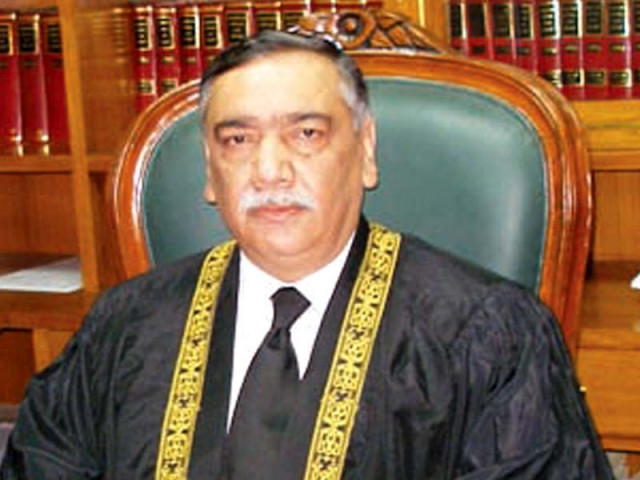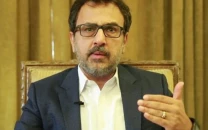Divided opinion on CJP Khosa as retirement looms
Lawyer groups support, boycott farewell events for outgoing chief justice

Justice Asif Saeed Khosa. PHOTO: EXPRESS
The Supreme Court Bar Association (SCBA) has announced it will host a farewell dinner in the outgoing CJP’s honour on December 19.
SCBA President Syed Qalb-e- Hassan confirmed to The Express Tribune that the association will organize a farewell dinner and attend all events honouring the retiring chief justice, adding that Asma Jahangir group members, including Yaseen Azad, Azam Tarar and others, were also backing the SCBA executive committee’s decision to give the farewell dinner.
On the other hand, the Balochistan Bar Council, in a statement issued Tuesday, announced it would boycott all farewell receptions for CJP Khosa. According to the statement, Balochistan lawyers had made the decision in protest against the Supreme Court’s recent judgment in the Army chief tenure extension case, calling the court‘s ruling a revival of the ‘doctrine of necessity’.
Talking to The Express Tribune, Council representative Muneer Kakar said that Balochistan’s lawyers were already unhappy with the outgoing CJP Khosa for not making the Quetta Commission report findings part of a judicial order. Balochistan lawyers are also disappointed with his role in the Justice Qazi Faez Isa case, he added. Justice Isa is currently the only apex court judge from Balochistan.
Similarly, a Pakistan Bar Council (PBC) representative has announced that the Council will make a decision on attending farewell events in its executive committee meeting in Karachi on December 14. He also expressed disappointment over the court’s decision in the army chief tenure extension case.
However, many senior lawyers believe Justice Khosa has been one of the best judges in the country’s history. They contend that, despite a few controversial rulings, his achievements, including his services for the betterment of the criminal justice system, would be remembered for many years.
Unlike his predecessors Iftikhar Muhammad Chaudhry and Mian Saqib Nisar, they point out, the incumbent chief justice has no ‘favourite lawyers’ or group to defend him in the bar. Likewise, no one alleges that any particular lawyer or chamber was a favourite of the retiring chief justice and that he had given them undue relief.
It has also been witnessed that the bench-bar relationship has been tense on several occasions during the tenure of CJP Khosa.
Relations between the bench and the bar first came under strain during CJP Khosa’s tenure when he took steps for judicial reforms in the country, especially regarding Sections 22A and 22B of the Criminal Procedure Code (CrPC) and the establishment of model courts. Lawyers had boycotted court proceedings over the initiatives.
Although the matter was then amicably resolved, bench-bar tensions arose again over the presidential references filed against two judges — Justice Qazi Faez Isa of the Supreme Court and Justice KK Agha of the Sindh High Court (SHC).
The Supreme Judicial Council (SJC) subsequently issued show cause notices to the two judges. The bar believes the presidential references against the two judges had been filed with mala fide intent.
Superior bars had also expressed serious reservations about a CJP statement urging lawyers to launch a movement called the ‘Tehreek-e-Bahali Izzat-e-Wukla’ for the restoration of the dignity of the legal profession.
And to make matters worse, the Peshawar High Court (PHC) issued a contempt notice to outspoken Pakistan Bar Council (PBC) Vice Chairman Syed Amjad Shah over an interview he had given to a YouTube channel in which Shah levelled accusations of nepotism against the PHC chief justice in the matter of high court appointments. Responding to the contempt notice, all federal and provincial bars had then boycotted court proceedings.
There are several reasons for the growing tensions between the bench and the bar during CJP Khosa’s tenure.
For one, the bar has always remained ‘anti-establishment’. Consequently, whenever the bench has taken a pro-establishment stance, it has been strongly opposed.
A senior lawyer believes that another reason for bench-bar tensions is that, instead of focusing on issues-based politics, bar representatives often represent the popular sentiments of their voters, their primary objective being to remain in power for personal gain.
It must be mentioned here that this is not the first time bar representatives are boycotting farewell dinners for outgoing chief justices. The same has happened on the retirements of Justice Iftikhar Chaudhry, Justice Jawwad S Khawaja, Justice Saqib Nisar and Justice Sheikh Azmat Saeed.



















COMMENTS
Comments are moderated and generally will be posted if they are on-topic and not abusive.
For more information, please see our Comments FAQ